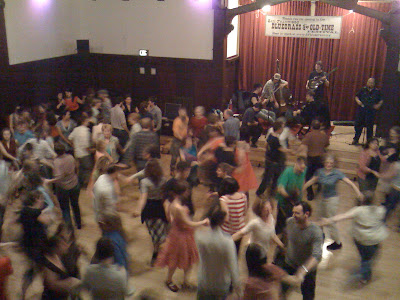I decided to avoid the mountains and stay warm on my drive to California, so I had to drive through the Deep South. I risked the high blood pressure and listened to some local radio across Georgia, Alabama, Mississippi, Louisiana, and Texas so I wouldn't run out of podcasts on my 1GB iPod Shuffle when I got to the big empty places where there aren't any radio stations at all.
The first thing that disturbed me was Christian political talk radio. In California, people know that religious conservatives exist, but the media maintains some sort separation of Church and State. You just don't talk about God while you're talking politics. Even in the Midwest, people seem to have their beliefs and have their politics, but at least pretend publicly that law is some sort of civil contract not determined by religion. But driving through the South, I heard talk show hosts openly explain that their pro-gun, pro-war, pro-death penalty, anti-abortion, anti-gay, anti-immigrant politics were right because that's what the Bible says. One caller to a Christian political program suggested that we should deal with "illegals" by deporting them and forcing them to sign a "contract" that says that if they are ever caught in America again, they'd be executed. The explicitly Christian host didn't think that was going far enough. He said we should implant them with chips like they put in pets, except explosive, so that if they ever cross the border, the chip will instantly explode and kill them. I took a deep breath, prayed my car wouldn't break down, and switched to a music station.
There apparently is a whole genre of ultra-backwoods country music that's popular way down south that I was completely unaware of, despite living in the hills of Southeastern Ohio for a decade. I couldn't believe what I was hearing. The lyrics speak for themselves:
(Song titles linked to Videos on YouTube, which you have to listen to, though the videos sort of ruin the hillbillyness of the songs with their Hollywood slickness.)
A Different World by Bucky Covington
A song of nostalgia for lead-based paint, getting the belt, and prayer in school.We were born to mothers who smoked and drank
Our cribs were covered in lead-based paint
No childproof lids
No seatbelts in cars
Rode bikes with no helmets
and still here we are
Still here we are
We got daddy's belt when we misbehaved
Had three TV channels you got up to change
No video games and no satellite
All we had were friends and they were outside
Playing outside
School always started the same everyday
the pledge of allegiance, then someone would pray
not every kid made the team when they tried
We got disappointed but that was alright
We turned out alright
No bottled water
We'd drink from a garden hose
And every Sunday,
All the stores were closed.
It was a different life
When we were boys and girls
Not just a different time
It was a different world
International Harvester by Craig Morgan
Kinda catchy, even if he's proud of the 3-mile line of cars behind his combine.I'm the son of a third generation farmer
I've been married 10 years to the farmer's daughter
I'm a God fearing hardworking combine driver
Hogging up the road on my p-p-p-p-plower
Clug-a-lug-a-lugin 5 miles an hour
On my International Harvester.
3 miles of cars laying on their horns
Falling on deaf ears of corn
Lined up behind me like a big parade
Of late to work road rage jerks
Shouting obscene words flippin' me the bird
Well you my be on a state paved road
That black top runs through my pay load
Excuse me for trying to do my job
This year ain't been no bumper crop
If you don't like the way I'm driving
Get back on the interstate Otherwise sit tight and be nice
And quit your honking at me that way
Cause I'm the son of a 3rd generation farmer
I've been married 10 years to the farmer's daughter
I got 2 boys in the county 4-H
I'm a lifetime sponsor of the FFA
Hey that's what I make I make a lot of Hay for a little pay
But I'm proud to say
I'm a God fearing hardworking combine driver
Hogging up the road on my p-p-p-p-plower
Clug-a-lug-a-lugin 5 miles an hour
On my International Harvester.
Well I know you got your own deadline
But cussing me won't save you no time Haus
But this big wheel wide load ain't going any faster
So just smile and wave and tip your hat to the man up on the tractor
What do ya think about that by Montgomery Gentry
A true expression of the love-your-neighbor, do-unto-others Southern Christian culture.Heard it through the grapevine
My new neighbor don’t like my big red barn
’47 Ford, bullet holes in the door
Broke-down motor in the front yard
I've got a mind
To paint a plywood sign
And nail it up on a knotty pine tree
Saying "I was here first,
This is my piece of dirt
And your ramblin’ don’t rattle me"
Some people care about
what other people think
Worry ‘bout what they say
Let a little gossip
Comin’ from a loose lip
Ruin a perfect day
Saying “blah, blah, blah”
Just a-jacking their jaws
Gotta let it roll of my back
I don’t give a durn
What other people think
What do ya think about that?
I wear what I want to
Overalls, work boots
Crank my music up loud
Like to sling a little mud
On my four-wheel drive
Trick on into town
Shoot a little eight ball
Down by the pool hall
Drink a beer with my friends
Don’t judge me and I won’t judge you
‘Cause we all get judged
In the end
You know, I don’t give a damn
What other people think
What do you think about that?














